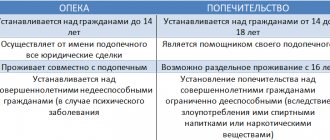Home / Housing disputes / Privatization and property: what is the difference, what is the difference?
Is privatization different from registration of ownership? This question worries people who are just planning to transfer ownership of an apartment or already have separate housing. Despite the similarity of concepts, privatization has fundamental differences from property.
Let us try to explain what is the difference between these concepts and what should we pay special attention to? For better clarity, let’s also consider a real-life example.
What is registration of ownership
This is the transfer of full possessions, uses and disposals, the transfer of rights from subjects of legal relations to others. To begin the procedure, the transaction must be documented and legal nuances and requirements must be observed. The completion of receipt of ownership of movables and other things is recorded in the appropriate databases.
The procedure for taking ownership in itself is a broader concept, unlike privatization. This includes the registration of contractual relations, will issues, deeds of property and other aspects. Moreover, all legally significant actions have different stages of registration. For privatization to be carried out, there must be support from regulations. After the collapse of the Soviet Union, virtually every property in the country belonged to society and the state, but after a certain number of years have passed, citizens can receive ownership of not only housing, but also entire factories, legal entities and other real estate.
What is privatization and why is it needed?
Privatization is the transfer of state property into personal ownership. The property can be anything - not only an apartment or a room, but also land and non-residential premises. Thanks to privatization, the right of ownership of housing appears, which means that such property can be sold, donated, exchanged for other property, left as an inheritance or pledged to obtain a loan. Such actions cannot be performed with non-privatized property - it can only be used.
Art. 209 Civil Code of the Russian Federation
For example, if you live under a social tenancy agreement in a state or municipal apartment, you cannot dispose of it at your own discretion. If privatized, the apartment will become personal property, and it can not only be sold or bequeathed, but also used as a contribution, for example, when concluding an agreement on moving to a social shelter for the elderly or registering rent.
Art. 1 of the Law on Privatization of Housing Stock
What distinguishes these two concepts
- Legal aspects. Registered real estate ownership is a more extensive procedure than privatization. This process includes the procedure for purchasing housing, donating and accepting inheritance, exchange and more.
- Transfer of ownership. In the process of obtaining property, the first subject of legal relations is the state. Obtaining ownership may also cost a legal entity.
- Payment for services. Typically, privatization is carried out by paying a certain amount (cash, checks, vouchers, etc.), but Russian legislation has one nuance. Property is registered free of charge, for example, when registering a deed of gift, exchange, or receiving an inheritance.
- Stages of the procedure. Privatization has clear legal steps: only those persons who have been given the right to do so can participate. The steps for obtaining ownership of housing are applied depending on the subject of legal relations, as well as on the property itself.
What is the difference between privatization and property rights?
Having defined the main characteristics of both concepts, it’s time to conduct a comparative analysis of them:
- The first thing that distinguishes privatization from property is the cost of the procedure.
The transfer of housing into the ownership of citizens itself is free. There is no need to buy an apartment or land from the state (see “How much does it cost to privatize an apartment?”). Buying property is an expensive undertaking. Thus, privatization (if it is not a buyout) is free, and the acquisition of housing into personal ownership under a purchase and sale agreement is paid (inheritance and donation are conditionally free).
- The second between privatization and registration of ownership is the subjects of the transaction.
Privatization of an apartment or plot involves contacting municipalities or departments, i.e. The state is always involved in the transaction. When registering housing as personal property, you are dealing with individuals or legal entities: grandchildren, heirs, grandparents, realtors - in a word, the previous owners of the property. The state is involved in rare cases.
- The third difference is real estate rights.
Privatization is available only to the employer and his family members. And only under a social rental agreement. Outsiders cannot participate in the transaction. The property does not have any special requirements. Do you have money for an apartment? Choose the option you like, pay and become the owner. Another thing is if it is a gift or inheritance - here you need to have certain rights to receive an apartment.
- The fourth and final difference is the methods of obtaining the object.
Privatization is available in one single form, while the acquisition of property is much broader: it includes purchase and sale, inheritance, and a gift agreement... In a word, there are a lot of options.
Example:
Bondarev was looking for the best way to acquire ownership of housing: privatization of an apartment or another method of transferring it into private ownership.
The conditions were as follows:
- Bondarev was the tenant of a one-room municipal apartment, which means he could theoretically privatize it.
- Bondarev had no relatives, which means he could not inherit a separate apartment, and, most likely, would hardly have received it as a gift.
- Bondarev saved up a certain amount of money - theoretically, he could purchase inexpensive housing on the secondary market, or buy living space from the state (slightly cheaper).
After weighing all the pros and cons, Bondarev settled on the option of free privatization of the apartment. There will be no need to buy the home from the state, which means the man will still have money left over for repairs. Bondarev was the sole tenant of a municipal apartment, which gives him the right to become the sole owner of the property. Subsequently, the man can sell the re-registered property and buy another home, but with a larger area and in a convenient area.
So there are plenty of differences. Property is a broader concept, while privatization is narrowly focused. Ownership allows you to dispose of the apartment at your own discretion. If housing is not privatized, it does not belong to a person.
Positive sides
Each procedure has its own advantages:
| Non-privatized housing | Citizens are prohibited from performing any manipulations with property. Since this right is given only to the state. The citizen acts in this case as an employer. |
| Taking ownership | After the transfer and until this moment into private ownership, shareholders are allowed to dispose of it. Contractual relations are possible: sale, exchange, execution of a will. |
Important. Privatization of residential property (on a free or paid basis) is not a mandatory procedure, which is one of the main positive aspects in this matter.
Example
Kovalev tried to find the most optimal option for obtaining ownership of living space: through privatization or another method of transferring it into private ownership.
The following conditions were set:
- Kovalev had accumulated a certain amount of money - from a theoretical point of view, he had the opportunity to buy budget real estate on the secondary market, or buy an apartment from the state a little cheaper;
- Kovalev had no relatives - accordingly, there was no possibility of inheriting a separate home, it is unlikely that he would have received real estate as a gift;
- Kovalev is the tenant of a one-room municipal apartment, which means that theoretically he had the right to privatize it.
Having assessed all the pros and cons, Kovalev decided to carry out free privatization. At the same time, there is no need to buy the property from the state, which means the citizen will have funds for repairs.
Since Kovalev is the only tenant of municipal housing, this fact gives him the legal right to become the sole owner of the apartment. In the future, he can sell the re-registered property, purchase another apartment, with a larger area, in a more suitable area.
Consequently, there are a large number of differences between such concepts as property and privatization. In fact, property is a broader term, and privatization is a narrowly focused one.
Ownership gives the right to independently dispose of real estate. In turn, if the apartment has not been privatized, it is considered that it does not belong to the citizen.
To find out until what year the privatization of land has been extended, see here.
Video: Privatization of state and municipal property
Expert opinion
Makarov Igor Tarasovich
Legal consultant with 8 years of experience. Specialization: criminal law. Extensive experience in document examination.
With the beginning of perestroika in 1991, a wave of transfer of state real estate into private ownership of citizens began. During this period of time, all segments of the population had a chance to get their own housing free of charge.
These were mainly apartments, land or private houses. Despite the fact that quite a lot of time has passed since that moment, the privatization procedure remains strange and incomprehensible for many.
In this article we will explain how the right to own real estate differs from privatization and what are the features of each form of property ownership.
Negative sides
After a person becomes an owner, he automatically participates in market relations.
Important. In addition to legal rights, a person also receives the obligations of a property taxpayer.
In addition, they have the following responsibilities:
- Maintenance of common property. This applies to any type: house, apartment, legal entity.
- Payment of utility bills at inflated prices. Exceptions include beneficiaries: large families, pensioners, etc.
- Funds are allocated for major repairs in an apartment building.
- Independent registration of inheritance if you plan to transfer living space. Otherwise, the share of square meters goes to the state.
How to buy a share in an apartment
You can easily find out that the apartment is in shared ownership: each owner is registered separately in the register , and the extract from the Unified State Register will indicate the size of the share.
If you decide to buy an entire apartment from shared owners, then the easiest way is to bring them all together and conclude one agreement. If you do not buy shares from all owners, this will be a little more difficult.
Things to consider
By law, co-owners have a priority right to receive an offer to purchase a share. In other words, before selling your part in the apartment to a stranger, you are obliged to offer to buy it out to other property owners.
To do this, notify the co-owners in writing about all the details of the planned sale. The terms of the transaction must be the same as for other buyers. The co-owners have one month to make a decision. Only after this can you sell your share.
If you are buying a share in an apartment, make sure that all the owners have refused the purchase. A refusal, like an offer to purchase a share, must be in writing, certified by a notary.
If the seller has violated the pre-emptive right of other owners to purchase, they can declare this within three months and transfer the buyer’s rights to themselves through the court. That is, if you do not check the written refusals of the co-owners, you risk losing the acquired share.
Necessary documentation for privatization
An important stage in privatization is the collection of documents. The process can take several months and cost several thousand. Therefore, individuals resort to professional agencies or lawyers. You will need the following information:
- Confirmation of occupancy in square meters. This confirmation may be a warrant held by the housing commission, or a social lease for an apartment, room or house, which the citizen entered into with the local authorities. In addition to the contract, an order is given to transfer the property for rent. Papers are submitted in the form of an original or a copy.
- Information about everyone involved in the process. At the same time, the citizen must be registered on these square meters. The information is obtained from the management agency that maintains records of each house register.
- Confirmation that the applicant has no arrears in paying utility bills. If they exist, even in an insignificant amount, privatization will not be allowed until all debts are repaid.
- Information on the place of early habitation. This could be an extract from the house register. Such documents must contain information regarding the lack of participation in other privatizations in other places of residence. This information is requested from the registration authority - a certificate is ordered for the availability of other real estate. If you have not previously participated in privatization, then after the request the papers will not be issued.
- Confirmation of citizenship of the Russian Federation.
- Extract from the cadastre.
- Passport and personal data of all participants in the procedure: both adults and minors.
Cost of privatization of an apartment?
MOST OFTEN, PRIVATIZATION ITSELF IS FREE. But you will have to pay a state fee of 2000 RUR for state registration of property rights. If an apartment is privatized by several people at once into shared ownership, the state duty is divided between all participants in the privatization. That is, if five people participate in privatization, the duty per person will be 400 RUR: 2000 RUR / 5.
clause 2 art. 333.18 Tax Code of the Russian Federation
Through government services you can pay the fee with a 30% discount.
clause 4 art. 333.35 Tax Code of the Russian Federation
Who can be a party to the transaction
Upon privatization:
- The first party is the state, represented by the body that owns the residential plot at the time of its transfer to people for rent.
- The second party to the contractual relationship is those who use the lease, as well as the citizens living with it. They must have a residence permit.
The first and second parties independently distribute shares in the property for all registered family members according to percentage.
One person can do the registration. To do this, the consent of the people living together must be notarized.
Thus, at the legislative level, the rights of children to participate in privatization were protected.
Important. Parents must, based on the Federal Law “On Privatization,” determine the percentage share for minor children.
Privatization: the essence of the concept, specifics
| Description | |
| Peculiarities | The concept of “privatization” seriously and for a long time entered the lives of Russian citizens in 1991. Immediately from this time, an all-Russian re-registration of state property took place. The described legal relations are regulated by the following regulatory legal act - Federal Law No. 1541-1 “On Privatization...”. |
In general, privatization means the transfer of state or municipal property into private property. Tenants of residential apartments, as well as members of their families living in the premises on the basis of a social tenancy agreement, have the right to carry out privatization. Provided that the privatization of a plot of land is carried out in accordance with the act of transferring the plot for indefinite use or a lease agreement. Directly on the basis of the listed documents, a citizen has the right to become the owner of a property.
FAQ
Question No. 1. Where should I contact? The transfer of ownership can be formalized in writing by a lawyer or a notary. Privatization is available to citizens at the authorized body, at the MFC.
Question No. 2. Is it mandatory to register all real estate with the new registration service? Real estate objects registered, for example, with the BTI, do not require mandatory registration at the state level. But there are some nuances, for example, when applying to the trustee authorities to obtain permission to register the sale of square meters where children are registered. In this case, registration will be required.
Question No. 3. Consequences of violations in the process of privatization and property? If there are violations during the privatization process, as well as during the process of taking ownership, the transaction will be determined as invalid. Therefore, there must be a clear understanding that a legally significant procedure is being carried out with all the resulting consequences.
Question No. 4. Are the procedures paid or free? Property is alienated during privatization on a reimbursable basis; until March 1, 2021, this service was considered free.
What kind of housing can be privatized?
The law prohibits the privatization of residential premises in disrepair, as well as in dormitories and in houses of closed military camps. It is not yet possible to privatize office residential premises. But there are exceptions: for example, you can privatize service housing if it was located on a state farm or collective farm.
Art. 4 of the Law on Privatization of Housing Stock
Consequently, all other apartments that are rented out under a social tenancy agreement and are located in ordinary houses can be transferred into the ownership of the people registered in them.
Individual (personal, full) ownership of the apartment
This is the case when the apartment is solely owned by one person.
He also manages it. It is indicated in the Title or in the Unified State Register of Real Estate for the apartment. True, this does not exclude the presence of other rights (for example, “Opens in a new tab.”>use rights) of third parties (members of his family, for example). Such characters have nothing to do with property and do not affect the disposal of real estate, but actually create an encumbrance (in the form of their right of residence) when selling an apartment.
In addition, if the only owner indicated in the Title / Extract of the Unified State Register is married, then the apartment can also be owned by his spouse by right Opens in a new tab.">"joint ownership of the spouses."
. Online order Extracts from the Unified State Register and other SERVICES for purchasing an apartment - HERE.
Is it possible to privatize a share in an apartment or house?
Any living space can be privatized into the common property of several persons or into the personal property of one party. An example of community property would be a house that is shared between multiple parties. In this case, the shares that belong to them are indicated, and in total they must be equal to one. A house or apartment is an integral object, therefore, such premises can be privatized either in the name of one person or in shared ownership of at least two persons. Accordingly, privatization of your separate share in the apartment is not feasible. Privatization of a shared nature may be in unequal shares if we are talking about a common decision of all interested parties. In such a situation, one should not forget about respecting the rights of children under the age of majority. Guardianship and trusteeship authorities are responsible for the infringement of the rights of minors, so they can refuse privatization to anyone, acting for the benefit of the children. There are also cases when one of the parties decides to refuse to privatize a share in the house. Then this share is divided among the rest of those wishing to privatize housing. A person who has already been a participant in the privatization program for another residential property does not have to issue a refusal, but simply provide all the necessary documents indicating a previously carried out privatization. And remember, if a citizen, for example, your spouse, refuses to privatize an apartment in someone else’s favor, then it will no longer be possible to discharge him from the privatized apartment!
Step-by-step instructions for the procedure
To exercise this opportunity, persons who have a legal basis to participate in the process again must:
- Prepare a technical passport of the residential premises.
- Obtain a certificate stating that the housing has not been privatized previously.
- Submit an application to the local government authorities with a package of all necessary documents.
- Conclude an agreement with the local administration on the transfer of the premises to private ownership.
- Obtain a certificate of ownership from the registration office.
All citizens of the Russian Federation who meet certain legal conditions have the right to preferential privatization of housing. But to clearly define all the intricacies of the process, you need to seek legal help from professionals.









